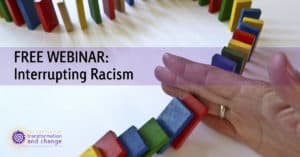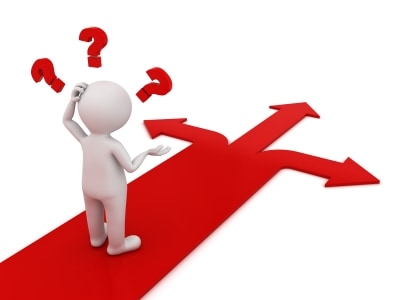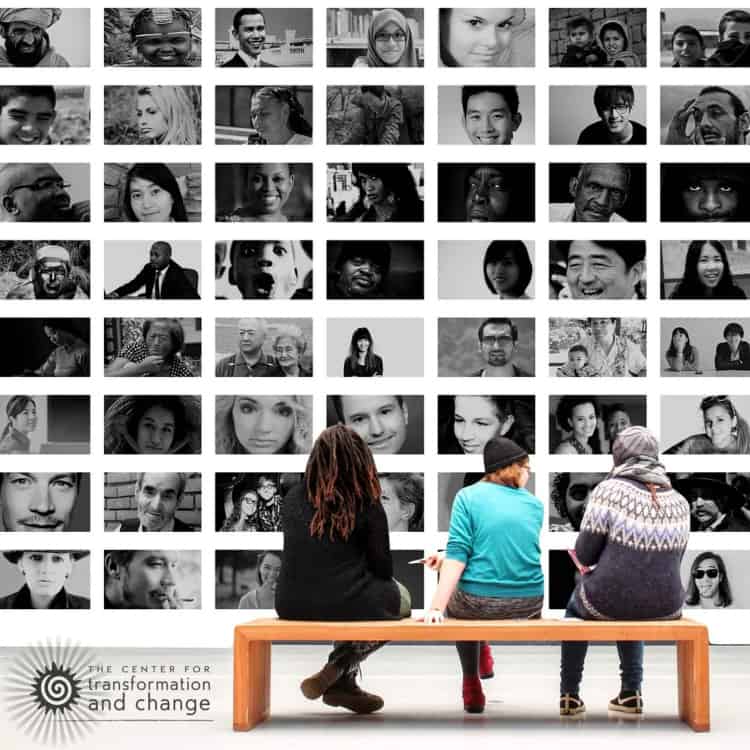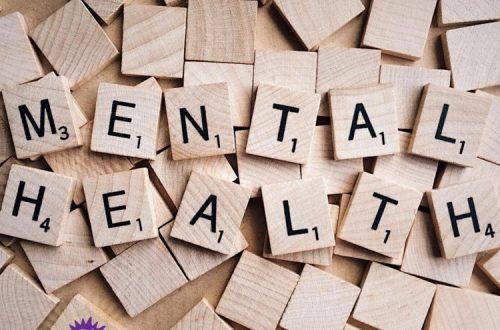Think You’ll Never Overcome Being Called Racist?
Can you imagine how different our world would be if – when faced with our racist comments – we each chose to embrace the moment and humbly, honestly and authentically engage people of color?
But defensive behaviors, fears, unproductive thoughts and feelings keep us stuck – and ineffective as white allies. The ways we choose to react out of deep fear of being called racist undermines our core values and vision of ourselves as effective change agents.
But there IS another way.
The first step is to recognize – and own – our fears and defensive reactions.
5 Common Racist Behaviors and Attitudes of Whites
In my free, 1-hour webinar taking place 2/1, Interrupting Racism: Our Role and Responsibility as White Allies – I’ll discuss common racist attitudes of whites, amongst other hot button topics.
One click and you’re in…sign up here to get the tools you need to Interrupt Racism.
Five typical white racist behaviors & beliefs (conscious and unconscious):
1. They believe they’ve “earned” what they have, rather than acknowledging the extensive white privilege and unearned advantages they receive; believe that if people of color just “worked harder” or “pulled themselves up by the bootstraps”…
- They overlook or simply don’t bother to notice the daily indignities that people of color experience; they may deny them and/or rationalize them away with PLEs (perfectly logical explanations).
- They work to maintain the status quo and protect the advantages and privileges they receive. They may use fear/intimidation, downright sneaky tactics, or shift gears and try to “fit in” and be liked.
- They may believe that white cultural norms, practices and values are somehow “better” or the “right” or “only” way. If a person of color doesn’t see eye to eye, then they’re just “too sensitive.”
- They internalize the negative stereotypes about people of color and believe that whites are smarter and superior to people of color. They may rush to judgement about a person of color, sometimes unconsciously.
Can you relate?
It’s simply socialized behavior.
I know. Being called racist was incredibly difficult, especially given the work that I do. But I took that pain and began to look at myself with real-life goggles – not Kathy’s goggles. I started to realize how my comments and behaviors affected people of color.
Can You Change Your Racist Behavior?
Even after decades as a change agent, I still have moments where I freeze. I bet you too have experienced moments where you don’t know how to best respond. Maybe you didn’t confront racist comments for fear of hurting a relationship or losing your chance of being hired for a job.

I can still feel triggered and become aggressive when confronting other whites on their comments and actions. The problem with this is that I miss an opportunity to build a bridge for deeper learning and growth.
But there is light at the end of the tunnel: I can recognize my behavior (sooner than I did before) and come back to apologize and make amends – and work to try harder next time.
This isn’t a journey about perfection. It’s a journey about progress. One step at a time.
You, too, can recognize your limiting racist behaviors and change your reactions to be an effective change agent for racial justice.
In my free 1-hour webinar, Interrupting Racism: Our Role and Responsibility as White Allies, I’m getting real on how you can recognize your behaviors, your reactions, your triggers. And I’ll share some of my favorite tools that I use to engage effectively as I work to create racial justice.
I want to be a force for positive change. Count me in.
Interrupting Racism: Compassion Training 101
If you want others to be happy, practice compassion.
If you want to be happy, practice compassion.
-Dalai Lama
At times, being a change agent can be overwhelming. I admit to being triggered by comments from whites – and the anger in me cries out, “Ugh! I want to take them out!”
But I compose myself. I remember all the people of color and other whites who had compassion for me when I uttered racist comments. They met my racism with love and grace as they confronted me, helping me to move through my guilt and shame.
As change agents, we CAN make a difference.
But before we can engage others effectively and consistently, we need to humbly realize our own racist behaviors and attitudes – and find the courage, willingness and commitment to speak out.
My free webinar, Interrupting Racism: Our Role and Responsibility as White Allies happens 2/1 – and it can help you with effective, proven tools to dismantle racism on campus or in your organization.
Enough is enough. I want to start building the foundation I need to Interrupt Racism. Sign me up!




